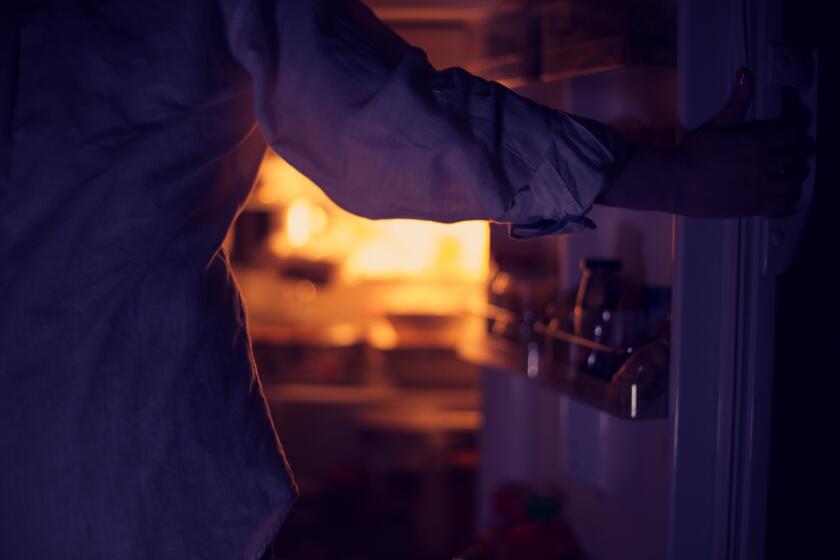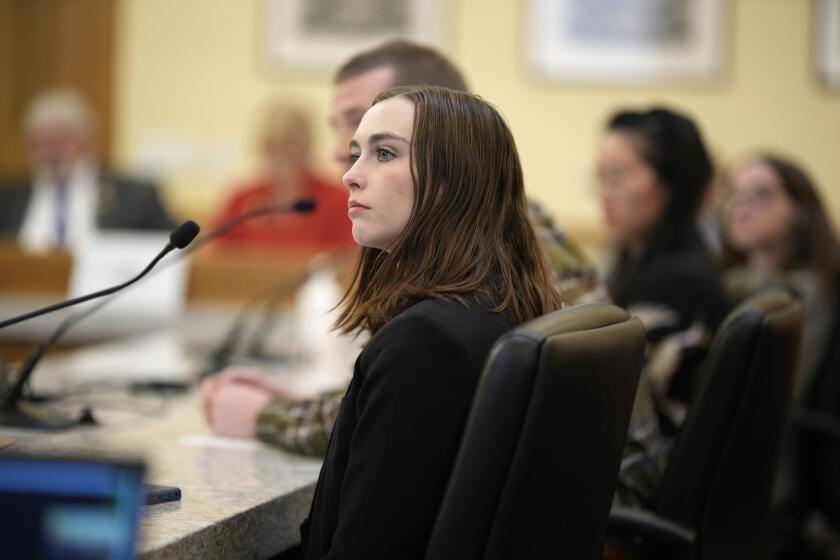Opinion: How Ina Garten changed my life

- Share via
People often imagine eating disorders as the result of diet culture, low self-esteem and a distorted body image. While these factors contributed, the eating disorder I developed as a teen was an ouroboros, born from the suffocating grip of my first encounter with depression. In an attempt to cope, I turned inward, seizing control over the one thing I could: my body. Every morning I stood in front of the mirror, pinching the skin around my waist, measuring my self-worth by what fit in my hand.
Depression and anorexia became inseparable, locking me in a downward spiral. There was no drive to get up, no urge to engage in daily life — only an emptiness that drained the world of color and purpose. Of all things, it took months of watching Ina Garten — the Barefoot Contessa, whose memoir comes out Tuesday — to begin my recovery.
The summer after high school, I spent hours cocooned on the couch, bingeing on the Food Network lineup instead of food itself. It felt like cheating the system. In lieu of eating, I watched Ina scoop handfuls of muffin batter while explaining foreign concepts like joy in food and pleasure in consumption. She escorted me into a light-filled kitchen, placing finished products alongside freshly cut sunflowers. “How easy is that?” she’d ask. I wanted to tell someone how hard it was.
How might I have changed my behavior if I learned about unhealthy eating and period loss in class?
My parents were loving and attentive, but my depression took them by surprise, causing them to overlook the alarming changes in my body until the day I collapsed on the kitchen floor with a half-chewed apple — ingested in desperation as my vision went dark — still in my mouth.
At the doctor’s office, I stepped onto the scale. As the final number settled, I heard a sharp intake of breath. I turned to see my mother’s hand fly to her mouth, her eyes wide with shock. “Your temperature is higher than your weight,” the nurse said quietly. “I’ve never seen that before.”
My face drained of color, and I felt the worried eyes of those around me flitting across the room. I wasn’t trying to waste away. It was just that shrinking — taking up as little space as possible — felt like the only way to manage the unbearable weight of existing. My parents brought up nutritionists and therapists, but I convinced them that I could handle this on my own, that it wasn’t a big deal, just a phase I could snap out of if I wanted.
My days merged into one another, and the longer I remained horizontal, the easier it became to avoid eating. After an entire summer of this routine, something shifted. Inspired by endless days spent watching “Barefoot Contessa” marathons, I gradually began to cook — not elaborate dishes, but simple meals using basic ingredients. I experimented with flavors, unsure how they’d turn out, initially too horror-struck to sample. Then I started tasting my attempts, my nervous system on edge, feeling an overwhelming urge to calculate the calories in every bite.
Lawmakers in states including California, Colorado, Texas and New York are taking big, legislative swings at the eating disorder crisis.
Sometimes it turned my stomach. But other times, the small accomplishment of creating something edible made me want to wake up the next day. The joy on Ina’s face as she effortlessly guided me through each step, her warm voice reassuring me that it was OK to make mistakes, made me a little less afraid to try again.
Exposure therapy, I called it — a small taste to ensure the balance was right. I spent months memorizing the Food Network lineup, absorbing everything I could about food as if I would nourish myself through knowledge alone. I consumed ample nutrients in theory, but the reality of eating often still felt impossible. At night I’d sob, longing for the camaraderie of a shared meal, desperate to understand the connection others found in cooking and eating together. The thought that I might never enjoy a dinner party with friends, that food would always be a source of pain, haunted me.
So I imagined that if I kept watching, if I kept pulling up a stool to Ina’s kitchen island and leaning in to smell the sauce simmering on the stove, something might change. She’d offer me a cup of tea with a freshly baked scone and talk about how she and Jeffrey sourced the ingredients from a charming village in France. I’d listen to her stories about the magical touches she’d discovered that made the recipe just right, and we’d laugh together. I played these scenarios over and over in my mind, willing them into existence, hoping that someday I’d sit with someone I loved, as eager to dive into a new culinary experience as I would be to hear about their life.
The grip of depression loosened gradually; over time, my longing to eat something without panic began to supersede all else. And the little voice that once dictated my every move, driving my eating disorder, grew quieter.
That voice never vanished completely. Body image remains a challenge, particularly as I age and after I had children. I’ve come to regard the voice as a small, feral pet that occasionally needs reassurance. I softly tell it: “It’s OK. I don’t need you right now. You can rest. I can rest.”
I’d be lying if I claimed to be fully recovered. For me, recovery is a moving target, a state of flux. But I’m no longer at the mercy of the beast that once ruled my life. I may never be a great cook — I’m impatient, disorganized and inefficient under pressure. But when I read Ina’s memoir, I’ll still hope to find reconciliation with ideals she embodies — exemplary results in the kitchen, alongside a life where food is a celebration instead of a challenge. Even if these aspirations remain beyond my grasp, I’ve already found something more valuable: the joy of eating and sharing food with those I care about.
Molly Wadzeck Kraus is a writer living in Trumansburg, N.Y. She is working on a memoir about mental illness, addiction and motherhood.
More to Read
A cure for the common opinion
Get thought-provoking perspectives with our weekly newsletter.
You may occasionally receive promotional content from the Los Angeles Times.











